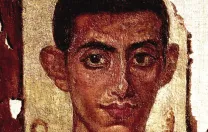In an “Imitator’s Note” prefacing her new collection, After Callimachus: Poems, professor of English Stephanie Burt writes, “These pages reflect, interpret, adapt, respond to, and sometimes simply translate the poems, and parts of poems, that the ancient poet Callimachus wrote.” Among them are works honoring the goddess Artemis, the member of the Greek pantheon to whom, Burt suggests, Callimachus may have felt closest: “icon of skill and erotic fulfillment and wildness, and of adventure in a world without adult men.” The selections reprinted* are from the Aetia, his most famous poem and “a big book of explanations,” writes classicist Mark Payne in his foreword: “a four-volume collection of curiosities from the Greek world at large, spliced with poetic theory and polemics, and enlivened with episodes from his own life.”
~The Editors
*Aetia, book 1, frag. 31g, and frag. 620 and 731
Aetia, book 3, frag. 80-82
Excerpted from AFTER CALLIMACHUS: Poems by Stephanie Burt. Foreword by Mark Payne. Copyright © 2020 by Stephanie Burt. Published by Princeton University Press. Reprinted by permission.









